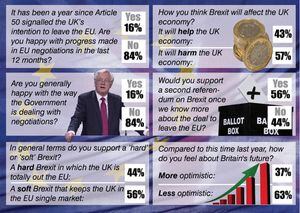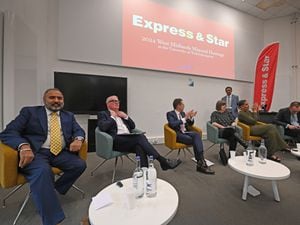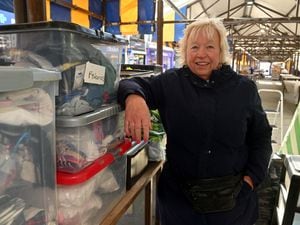Article 50 one year on poll: Plenty of bumps in the Brexit road
Today marks the first anniversary of Britain giving notice to leave the European Union by triggering Article 50.

It is also exactly 12 months from the date when we finally sever ties with the bloc once and for all.
After lengthy negotiations, Prime Minister Theresa May and Brexit Secretary David Davis finally agreed to the terms of a transition deal which means that Britain will remain a member of the Single European Market until the end of 2020.
Attention will now turn to negotiating a permanent trade deal for when Britain leaves altogether.
Opinions, as ever remain divided, but one thing does appear to have united the vast majority of people who took part in our online readers' poll on the subject.
The whole Brexit process does not appear to be going as well as most people would like.

More than 3,000 people who took part in our poll, and by far the majority are dissatisfied with how the negotiations have progressed.
Just 16 per cent of those who responded said they were happy with progress so far, with the same number saying they were satisfied with the way the Government had handled the situation.
The other 84 per were both dissatisfied with progress so far, and also with the way the Government has handled it.
This is despite the Black Country and Staffordshire voting overwhelmingly to leave the EU in the referendum in June 2016.
Divided
Opinions were much less clear cut, though, on what type of Brexit people wanted to see. In total, 56 per cent said they wanted to see a 'soft' Brexit, with Britain remaining in the EU single market, while 44 per cent wanted Britain to leave completely.
Opinions were similarly divided when it came to the prospects of the economy, with 43 per cent thinking Brexit will have a positive effect, and 57 per cent believing it will be harmful.
Perhaps surprisingly, a clear majority – 56 per cent – said they would like to see a second referendum once the details of the final settlement emerged.
But let us not forget, it is not only Remainiacs who want another referendum. The architect of Brexit, Nigel Farage, says he would consider such a move in a bid to stop the 'whinging and whining' of anti-Brexit campaigners.
The gloomy picture is summed up by the 63 per cent who said they felt less hopeful about Britain's prospects than they did this time last year. Only 37 per cent said they felt more hopeful.
'Hold our nerve'
Walsall North's Tory MP Eddie Hughes, a staunch Brexiteer, concedes that the Government should be doing more to promote the positive aspects of Brexit.
"I have absolutely no doubt that Britain will thrive outside of the EU, but we have got to do a better job of getting the message across," he said.
"For me there is no 'hard' or 'soft' Brexit. You can't get a little bit pregnant. Leaving the EU means coming out of the single market and the customs union, and it means controlling our own borders.
"If anything, the negotiations since Article 50 was signed prove just how entrenched we have become in terms of our relationship with Europe.
"Our departure is an extremely complicated thing to address.
"For now we need to hold our nerve and continue our progress in getting out of the EU, which is exactly what people in Willenhall, Bloxwich and the rest of the Black Country voted for."
Complex
Defence Secretary Gavin Williamson, the MP for South Staffordshire, called for calm and said the Government was committed to getting the best deal for the country in the negotiations.
"We are concentrating on delivering Brexit," he told the Express & Star.
"Leaving the EU was never going to be easy. It is proving to be a long and complex process. But the Prime Minister and the Government are making really good progress in the talks.
"There is no doubt that Brexit is a very contentious issue.
"People can rest assured that the Government remain committed to delivering the democratic will of the British people and in getting the best possible deal for the country."
Jill Seymour, a UKIP MEP for the West Midlands, says breaking away from the control of the European Union cannot come soon enough.
But she believes the Government is giving up too much ground to Brussels.
In the latest round of European Parliament votes, she called for an end to the European Court of Justice's jurisdiction in the UK after Brexit, and urged tariff-free trade negotiations to begin immediately.
Common sense
"More than 17 million people voted for our independence back in 2016, and yet our Government is still making concessions," she said.
“For example, we will still be taking on all EU regulations on transport, which includes some nonsense policies. Let’s hope some true British common sense prevails and they start to listen.
“Freedom from the EU will allow us to revolutionise transport in the UK, so we can focus on upgrading existing infrastructure, rather than wasting time, money and effort on the EU’s large, grandiose schemes,” says Mrs Seymour, who is UKIP's transport spokesman.
John Spellar, the Labour MP for Warley, said he was not surprised that the poll suggested people were not happy with the progress of the Brexit negotiations.
"The Government has certainly mishandled negotiations," he said. "They need to up their game to get a proper deal that they can bring back to Parliament."
Close relationship
Wolverhampton South East's Labour MP Pat McFadden has been a harsh critic of the Government's handling of the Brexit talks.
He recently welcomed clarification of Labour's position on the UK's EU departure, following a speech in the West Midlands by Jeremy Corbyn.
Mr McFadden, who sits on the Brexit Select Committee, said it was 'welcome and overdue' that the Labour leader vowed that the party would seek a final deal that gives full access to European markets and maintains the benefits of the single market and the customs union.
“Remaining part of a customs union arrangement would be good for our economy and help us to meet our commitment not to have a hard border between Northern Ireland and the Republic of Ireland," he said.
“There are big economic benefits in maintaining a close relationship to the single market.”
One thing is certain, with just one year to go until Britain goes it alone, nothing has been set in stone – apart from the Government's decision to turn our passports blue that is.
A no-deal Brexit is still possible, while an increasingly vocal minority in Parliament are becoming bolder by the day in pushing for a second referendum.
For Mrs May and her Government, job number one appears to be finding a way to resolve the contentious issue of how the border between Ireland and Northern Ireland should be handled.
The waters may be calm for the time being, with the EU supporting Britain’s proposal for a transition deal that allows the UK to implement new laws and processes over a certain time period after the exit next year.
However, it is certain that there will be plenty more ups and downs as Brexit day draws ever closer.





